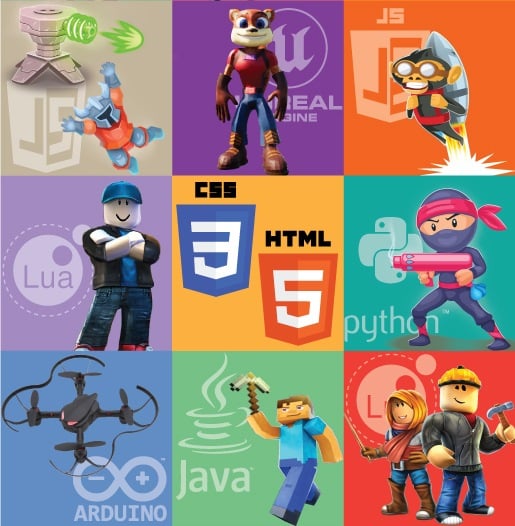The benefits of choosing CodaKid
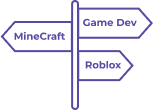 10 Educational Pathways
10 Educational Pathways 750+ Expertly Crafted Videos
750+ Expertly Crafted Videos 800+ Hours of Student Projects
800+ Hours of Student Projects 100,000+ Happy Students
100,000+ Happy Students
Try Self Paced for only $29 /mo or get Private Online Lessons starting at $249 /mo.
Try them both for free.
 Jo Warn, Grandparent5
Jo Warn, Grandparent5 We love everything about CodaKid! The customer service is great. They’re flexible and easy to work with. Our... 7 year old grandson has been working with his tutor for over a year and it’s exciting to watch him learn and grow. Ethan has an incredible way of communicating and interacting with Jonathan which makes every coding class so beneficial and an exciting part of Jonathan’s education. What great instructors CodaKid choose. I highly recommend CodaKid!Show more
We love everything about CodaKid! The customer service is great. They’re flexible and easy to work with. Our... 7 year old grandson has been working with his tutor for over a year and it’s exciting to watch him learn and grow. Ethan has an incredible way of communicating and interacting with Jonathan which makes every coding class so beneficial and an exciting part of Jonathan’s education. What great instructors CodaKid choose. I highly recommend CodaKid!Show more Tomáš Baránek, Parent5
Tomáš Baránek, Parent5 We are very happy with CodaKid Coding Academy. Our son is learning Java and Minecraft modding. He enjoys... it a lot and made a huge leap in his skills.Show more
We are very happy with CodaKid Coding Academy. Our son is learning Java and Minecraft modding. He enjoys... it a lot and made a huge leap in his skills.Show more Terrence Masson, Parent5
Terrence Masson, Parent5 I've tried several online 1-on-1 coding classes for my son (starting at age 7, he's now 9) and... CodaKid is outstanding in the quality of its instructors and ease of operation; he's doing Java coding for Minecraft mods and LOVES it. Highly recommended.Show more
I've tried several online 1-on-1 coding classes for my son (starting at age 7, he's now 9) and... CodaKid is outstanding in the quality of its instructors and ease of operation; he's doing Java coding for Minecraft mods and LOVES it. Highly recommended.Show more Ci Tro, Parent5
Ci Tro, Parent5 My 12 year old loved their Minecraft programming course. It kick-started his interest in computer science. A huge... plus for busy parents is the outstanding and swift support from CodaKid. No frustrating long deadlock, but friendly, competent help to keep the kids going and exploring. Brilliant!Show more
My 12 year old loved their Minecraft programming course. It kick-started his interest in computer science. A huge... plus for busy parents is the outstanding and swift support from CodaKid. No frustrating long deadlock, but friendly, competent help to keep the kids going and exploring. Brilliant!Show more Jennifer H., Parent
Jennifer H., Parent We LOVE CodaKid. We couldn’t even imagine a better experience. People are amazing -- very warm, supportive and... enthusiastic. And the program that they have designed is fabulous. My kids have attended several other programs and say Codakid is far surpasses the others .Show more
We LOVE CodaKid. We couldn’t even imagine a better experience. People are amazing -- very warm, supportive and... enthusiastic. And the program that they have designed is fabulous. My kids have attended several other programs and say Codakid is far surpasses the others .Show more Christy Lynn, Parent5
Christy Lynn, Parent5 This has been a great addition to our home school curriculum! My son loves spending time in the... program and even jumps back in after school when he's finished his other work. The response to help requests is always immediate and they do a great job finding and explaining the issues he may be having.Show more
This has been a great addition to our home school curriculum! My son loves spending time in the... program and even jumps back in after school when he's finished his other work. The response to help requests is always immediate and they do a great job finding and explaining the issues he may be having.Show more
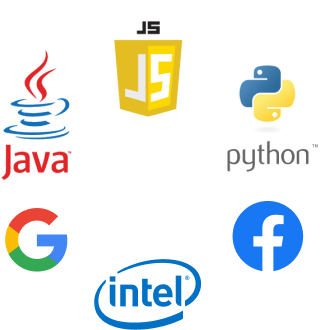
Professional Tools and Languages
CodaKid students learn professional languages such as Python, JavaScript, and Java while using the same tools used at companies like Google, Facebook, and Intel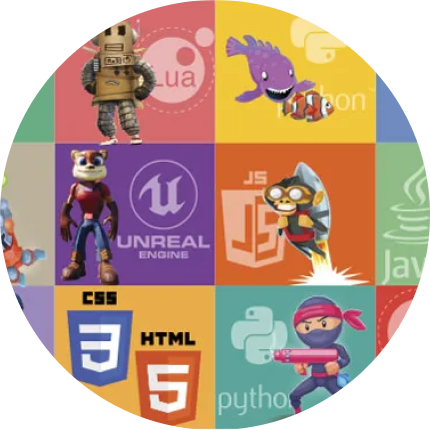
Make Learning Fun
CodaKid teaches kids important skills with the games that kids already love. Make professional grade software while earning badges and being awarded points!
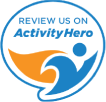 ACTIVITY HEROBest camps, classes and kids’ activities
ACTIVITY HEROBest camps, classes and kids’ activities Parents’ ChoiceGold Award for Best Coding Solution
Parents’ ChoiceGold Award for Best Coding Solution SIIA CODiEFinalist for Best Coding Solution
SIIA CODiEFinalist for Best Coding Solution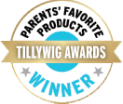 TILLYWIGBrainChild Award for Best Coding Solution
TILLYWIGBrainChild Award for Best Coding Solution
When do I make my first payment?
Once you have completed your call with our Enrollment Specialist, you will be billed for your first month’s tuition. In the event that you do not like CodaKid, we offer a full money-back guarantee within your first 2 sessions.What are your support hours?
CodaKid offers online support 7 days a week! For the quickest responses, please contact us any time Monday- Friday.My child does not fall between the ages of 7 to 15. Can he still take the course?
Yes! Our courses are designed for children as young as 7. Children younger than 7 may take them, but may need more support from our instructors or a parent. We have also had a number of adult students take our self-study video courses with a lot of great success.My child doesn't have any experience. Are these courses good for beginners?
Absolutely! Our introductory and beginner courses (labeled as ‘INTRO’ and ‘BEG’ on the platform) are designed for students with little to no experience. These courses start off slower and ramp up steadily. Videos can be rewound and re-watched if necessary, and the video speed can be slowed down or sped up to best accommodate different speeds. Our online instructional team is available for additional help when needed. Intermediate and Advanced courses build upon the foundation established in the beginner courses. It is highly recommended that students complete the introductory and beginner courses in each path prior to taking a higher level course.How long does it take to complete each course?
Most of our courses can be completed within a couple of hours based on the student’s desire to build and customize their game. That said, many of our more intermediate and advanced courses can take upwards of 20 hours to complete. The amount of time it takes your child to complete any given project will depend on the course and the child's speed.Which computer languages do you teach?
CodaKid teaches Python, JavaScript, Java, Lua, Scratch, C#, HTML, CSS, and the Unreal Blueprints scripting language - with more on the way! With CodaKid, students gain experience writing real code using the same tools that the pros use. We have a unique way of making our courses accessible to absolute beginners as young as age 7. We hope you'll give them a try!Where is CodaKid based?
CodaKid is based in sunny Scottsdale, Arizona in the United States.Who are the people behind CodaKid?
Our CEO and Co-Founder Lauren Nguyen, JD/MBA, is a seasoned education entrepreneur with over 20 years of experience building world class education programs. She co-founded CodaKid in 2014 and has helped lead CodaKid's growth from a small brick and mortar kids coding academy to an online coding school with students in over 120 countries.
Our Director and Co-founder David Dodge is a game designer and software architect who began working in product development for SEGA in the early 90s, and who later designed top-rated games for the Sony PlayStation and the PC. David is credited on over 30 titles for SEGA, Sony, and PC. David leads product development, marketing, and school partnerships at CodaKid.
What is CodaKid?
CodaKid is a kids coding platform that teaches kids how to use real programming languages and professional tools by creating games, coding apps, programming drones, building websites, and more.Do you have a free trial?
Yes! CodaKid provides a free trial for both our self-study and private tutoring programs. For our self-study, we provide a 14 day free trial with unlimited access to all of our courses. If you like our service, just stay on past the 14 days and your card will be automatically billed on day 14, then every 30 days until you decide to cancel. Otherwise, you can cancel at any time during your 14 trial and pay nothing. For our private tutoring program, we offer a free session to every new family. If you decide to continue after your trial, we will charge your card right before your 2nd session and every month thereafter until you decide to cancel.Are these online courses self-paced or live?
We offer both options through two great programs: our self-study video courses and our private online tutoring.
Our self-paced program can be taken anytime – on your schedule. Students will watch HD video lessons, pause the videos, code, design, and then test their work. Our friendly instructional team is there every step of the way with awesome, award-winning support! Just use our handy chat button inside the learning platform or email the support team.
Our private tutoring program will connect you with one of our excellent, US-based instructors from one of the top 50 universities in the country. Your instructor will guide your child through our award-winning curriculum using the Mastery Method- our unique, Socratic approach towards teaching coding.What Plan Will Be Best for My Child or Teen?
If your student is an absolute beginner, we recommend our Private plan so we can give him or her a personalized introduction to computer programming. If your student is a natural born techie who wants to learn how to become an independent game developer, web programmer, or game designer as quickly as possible, we recommend our Private Accelerated plan.Do you have a satisfaction guarantee?
In the event that you do not like CodaKid, we offer a full money-back guarantee within your first 2 sessions.Will my instructor change week to week?
CodaKid will make every effort to ensure that your child or teen has the same teacher each week. In the event that there is a family emergency or a seasonal change, we may need to find a new instructor. We will work with you and your student to make sure that the new instructor is a fit and guarantee your satisfaction.How much do private classes cost?
Our standard private tutoring plans start at $249 USD per month. This includes live instruction via Zoom with your private instructor, weekly homework assignments, daily progress reports, between session homework support from our teacher team, a free subscription to CodaKid's platform, and participation in our community events. For all private tutoring pricing info, please visit https://codakid.com/private-tutoring-plans/Do you have any specials for families with two children interested in private tutoring?
Yes! CodaKid features a 2-on-1 sibling special, allowing students to invite a friend or sibling to their private class for no additional charge.If my child has a technical issue, how does she contact your support team?
CodaKid students can use the red chat icon on the bottom right corner of the CodaKid learning platform if they ever need assistance. Most issues can usually be solved quickly through this portal, however if a student requires more assistance CodaKid will host screen share sessions with customers to solve more difficult issues.What concepts will my child learn in a CodaKid course?
Here are some of the concepts we teach:- Booleans
- Conditionals,
- Loops
- Variables
- Methods and Functions
- Arrays
- Switch Statements
- And much more!
What makes CodaKid different from other kids coding courses and platforms?
CodaKid’s award-winning courses feature . Our online academy has taught over 50,000 kids and teens how to program using the same professional languages and tools used by professionals at companies like Facebook, Google, and Amazon. CodaKid has two great ways to learn how to code:
1) Our self-paced online courses
2) Our private 1-on-1 online lessons.
CodaKid’s self-paced online courses are great for self-starters and feature over 700 hours of student projects. CodaKid also provides awesome support from a team of engineers and teachers to help you solve problems through chat or screen share if you ever get stuck or have questions.
CodaKid’s private 1-on-1 online lessons are the fastest way to learn how to code. Working 1-on-1 over Zoom with your own private instructor, CodaKid students work their way through CodaKid’s structured curriculum and complete weekly homework assignments, receive weekly progress reports, and more.How do you select your instructors?
We select our instructors from the top 50 universities in the U.S. and vet them for both their programming skills and their ability to teach students! Not all programmers can teach, and not all teachers can code, but our instructors excel at both. We train our instructors in CodaKid’s Mastery Method, a socratic approach to teaching coding, problem solving, and architectural thinking.Where are the instructors for your private tutoring program located?
All of our teachers are located in the United States of America and across every U.S. time zone!What happens If I need to reschedule a private session?
You can reschedule your Private or Accelerated Class up to 24 hours before your session day/time.What happens if I forget to cancel and miss my class?
Our policy is that classes must be rescheduled 24+ hours in advance. Unfortunately sessions that are not rescheduled in time are not eligible for a makeup class or refund. As CodaKid pays our teachers for no-shows, this is a strict policy.Can I get a free trial for multiple children?
CodaKid only offers one free trial per family. You can start a free trial for one student. If you like it, you can contact us to discuss adding more students.When will I be billed?
If you sign up for our free trial, you will receive 2 free sessions of CodaKid's private tutoring. Your trial period will start on the date of your first scheduled class, and end after your second. If you don't cancel your subscription before your 3rd session, you will automatically be billed for the selected membership fee every month until you cancel or change your subscription type.How do I get Started?
Your first step is to sign up for CodaKid’s 2 session free trial! Once we receive your signup information, we will send you a questionnaire to get your preferred schedule and other information to help us place you with the perfect instructor. Once you return the questionnaire, we will email and call you to confirm the start date and time of your first free trial session.Am I locked into a long term contract?
No. All CodaKid Private courses are billed month to month and can be cancelled from your next billing date forward.What happens if I forget to cancel and miss my session?
Our policy is that classes must be rescheduled 24+ hours in advance. Unfortunately sessions that are not rescheduled in time are not eligible for a makeup class or refund. As CodaKid pays our teachers for no-shows, this is a strict policy.Is there a sibling discount?
For a limited time, as a way of giving back during COVID-19, CodaKid students who enrolled in either Private or Private Accelerated can bring a sibling (or friend) to their online classes for FREE.I have multiple children. Do you have a Family Plan?
Yes! We offer a Family Plan for our self-study video courses, created for families with up to 3 students. Each student will receive their own account, each one of them nested under a parent account used to view progress and manage billing.Can I pause my account if we go on vacation?
Yes, you may pause your account and resume when you return.How long is CodaKid's program?
CodaKid's program is month-to-month with no long term commitments. However, if you are looking for a world class, multi-year kids coding program, you have come to the right place! Each CodaKid level is designed to take 4 to 6 months and will generally consist of several engaging projects. We are constantly adding exciting new courses, electives, and coding pathways.What is the recommended age to take CodaKid's private lessons?
CodaKid's private lessons are designed for ages 6 to 18.What type of computer and other technology do I need to take your private classes?
To take CodaKid's private lessons you will need a desktop or laptop computer running Windows or MacOS. If your child is taking our intro Scratch courses, you will need a mouse as well. Chromebooks and tablets are not compatible with CodaKid courses. You will need a high-speed internet connection of at least 10 Mbps. If you have any further questions, please email us at [email protected]What are programming games for children, and why are they important?
Programming games for children are educational video games designed to teach kids the fundamentals of computer programming and coding in a fun and interactive way. These games are important for several reasons:
Engaging Learning: Programming games make learning coding concepts engaging and enjoyable for kids, fostering a love for technology and problem-solving from an early age.
Critical Thinking: They promote critical thinking and logical reasoning skills, which are essential in today's digital world.
Preparation for the Future: As technology becomes increasingly integral to our lives, early exposure to programming can prepare children for future career opportunities in the tech industry.
How do programming games benefit children's cognitive development?
Programming games offer various cognitive benefits for children:
Enhanced Problem-Solving Skills: These games require players to solve puzzles and overcome challenges using coding logic, which sharpens their problem-solving abilities.
Improved Mathematics Skills: Coding involves mathematical concepts, and as children experiment with programming, they naturally develop better math skills.
Logical Thinking: Programming games encourage logical thinking and sequencing, helping children to approach problems in a structured way.
What age group is suitable for programming games, and are there different levels?
Programming games are typically designed for children aged 5 and above, though some simpler games can be introduced to younger children with adult guidance. These games often have varying levels of difficulty to accommodate different age groups and skill levels:
Beginner Levels: These are suitable for kids aged 5-8 and introduce basic coding concepts using simple commands and block-based coding interfaces.
Intermediate Levels: Geared towards kids aged 9-12, these games delve deeper into coding principles, teaching more complex algorithms and problem-solving strategies.
Advanced Levels: Designed for teenagers and older children, these games challenge players with advanced coding concepts and encourage them to create more complex programs and games.
Are programming games suitable for kids with no prior coding experience?
Yes, programming games are ideal for children with no prior coding experience. In fact, they are specifically designed to be accessible to beginners. Here's why:
User-Friendly Interfaces: Programming games often feature user-friendly interfaces with drag-and-drop or block-based coding, making it easy for kids to get started without typing complex code.
Step-by-Step Tutorials: Many programming games offer step-by-step tutorials that guide beginners through the basics, gradually building their coding skills.
No Coding Jargon: These games avoid overwhelming beginners with coding jargon and focus on teaching concepts in a simple and understandable way.
How can parents and educators support children in learning programming through games?
Parents and educators play a crucial role in facilitating a child's learning journey through programming games:
Choose Appropriate Games: Select games that match the child's age and skill level to ensure an enjoyable learning experience.
Set Time Limits: Encourage balanced screen time and set limits on gameplay to ensure a healthy balance between coding and other activities.
Engage in Discussions: Discuss the concepts and challenges the child encounters in the game to reinforce learning and provide guidance.
What are the safety concerns associated with children playing programming games?
While programming games can be educational and entertaining, parents and educators should be aware of safety concerns:
Online Interaction: Some programming games offer online multiplayer options, so it's important to monitor and restrict online interactions to ensure a safe gaming environment.
In-App Purchases: Be cautious of in-app purchases within the games, and consider disabling them or using parental controls to prevent unexpected charges.
Screen Time Management: Ensure that children do not spend excessive time on screens by setting healthy screen time limits and encouraging breaks.
Can programming games be a stepping stone to a career in computer science?
Yes, programming games can serve as a valuable stepping stone to a career in computer science or related fields:
Early Exposure: By starting to learn coding concepts at a young age through programming games, children can develop a strong foundation that will benefit them in more advanced computer science studies.
Passion Development: These games can ignite a passion for coding and technology, motivating children to pursue further education and careers in computer science.
Portfolio Building: Some programming games allow children to create their own games or projects, which can be showcased in portfolios when applying to educational programs or jobs in the tech industry.
Are there any resources or online communities for parents and children interested in programming games?
Yes, there are numerous resources and online communities available for parents and children interested in programming games:
Educational Websites: Many websites provide reviews and recommendations for programming games suitable for various age groups.
Online Forums: Online forums and communities allow parents to connect with each other, share experiences, and seek advice on incorporating programming games into their children's learning.
YouTube Tutorials: YouTube hosts a wealth of tutorial videos and walkthroughs for popular programming games, making it easy for both parents and children to learn together.
How can programming games encourage creativity in children?
Programming games can stimulate creativity in children in several ways:
Game Modification: Some programming games allow kids to modify existing games or create their own, giving them the freedom to express their creativity through game design.
Problem Solving: Encouraging children to find unique solutions to in-game challenges promotes creative thinking and innovation.
Storytelling: Some programming games involve storytelling elements, allowing children to create narratives and characters, fostering their imagination.
Do programming games align with educational standards?
Many programming games are designed with educational standards in mind, making them a valuable addition to formal education:
STEM Education: Programming games align with STEM (Science, Technology, Engineering, and Mathematics) curriculum goals, enhancing students' understanding of these subjects.
Coding as a Skill: As coding becomes increasingly recognized as a valuable skill, programming games contribute to the development of this skill in line with educational standards.
Problem-Solving: These games promote problem-solving skills, which are a fundamental aspect of educational standards in various subjects.
